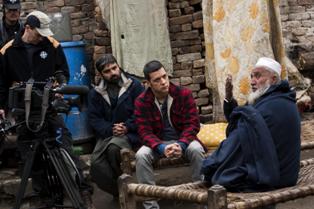Playback Hall of Fame: Swarovski Humanitarian Award

Celebrity and charity often go hand in hand, but true dedication to a cause is a rarer breed. In recognition of the individuals from the film and television industry whose efforts go above and beyond, Playback has established the annual Humanitarian Award, sponsored in its inaugural year by Swarovski, whose charitable mission is to bring clean water to developing countries, with a focus on children.
Our first recipient of the Humanitarian Award is CBC’s George Stroumboulopoulos, a fixture in the Canadian television industry since 2000 and radio host since 1993. As host of George Stroumboulopoulos Tonight and The Hour prior to that, Strombo’s youthful look and vibrant personality make him a direct conduit to television’s most sought-after audience, the 18- to 34-year-olds.
An advocate for many causes throughout his career, Stroumboulopoulos was in 2011 named an Ambassador Against Hunger for the United Nations World Food Programme (WFP). The first Canadian to hold the title, Stroumboulopoulos is charged with raising awareness of global food issues with Canadians.
The UN post was not one he accepted lightly, he explains.
“It’s a humbling thing. I spent almost a year thinking about it. I wanted to carefully consider what I thought I could bring to this discussion.”
The first media personality to represent WFP, Stroumboulopoulos says his goal is largely to continue to do what he and his team at George Stroumboulopoulos Tonight already does: seek to engage audiences with the issues surrounding global food resources and contribute to the conversation on a domestic and international level.
In addition to domestic projects in development, Stroumboulopoulos’ international presence extends to travelling to regions where food resources are in crisis, due to external factors such as politics or as a result of natural disaster. CBC chronicled his February 2011 trip to Pakistan, where he met with locals and regional WFP workers to better understand the issues plaguing the region after the floods of 2010.
Seeing others’ experiences first-hand was a critical part of gaining insight into the effects of food crises, he says.
“A lot of what you’re doing is asking people to come along with you on a journey like this,” he explains. “So you need to go see it first-hand. You go and pick up the humanity and the nuance of the situation.”
Food and nutrition are basic human rights, he says, and he’s proud to be working with a team of people in pursuit of achieving that for all.
“To me, food aid is a health and justice issue — people having a fair shot. Everyone has a right to justice and a fair shot at life.”
Photo: CBC / George interviews local Imam, Faisal Muhammed (R), in Kishawra, on 25 February, 2011, in the Swat Valley, Pakistan. The Taliban burnt down his family home, killing his 7 y/o daughter in the process, after her refused to submit to their rule and the townspeople rebelled.

 The definitive CDN broadcast and production resource.
The definitive CDN broadcast and production resource.










